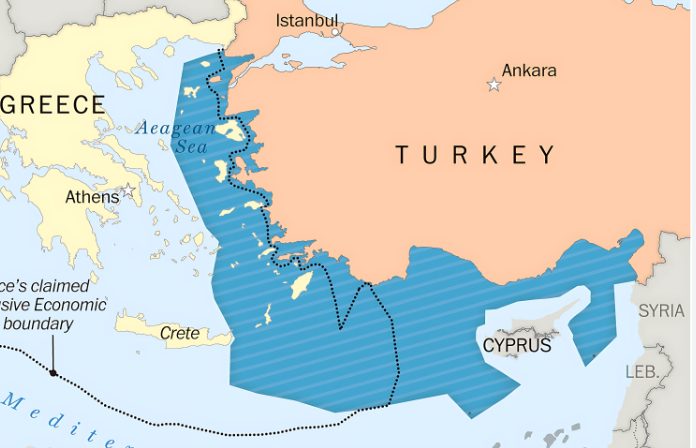Turkish President Erdogan and Greek PM Mitsotakis had a love fest in New York City, putting aside pas animosities, and promising to work together for a peaceful future in the region. Such thaws in neighbors relations have been announced with great fanfare over the last 35 years, but got nowhere. Can it be different this time?
What has been decided in the meeting?
In a statement after the meeting between Erdogan and Mitsotakis on the sidelines of the UN General Assembly, the Turkish presidency’s communication directorate said the new round of talks will be held in November as part of “the current positive climate in relations between Turkey and Greece.”
Mitsotakis described the meeting as “productive.”
Erdogan and Mitsotakis also affirmed their resolve to follow the road map unveiled during Greek Foreign Minister Giorgos Gerapetritis’ visit to Turkey earlier this month, the Turkish statement said.
Under the road map, the two countries’ deputy top diplomats are set to meet for political talks in mid-October and the two countries will hold a high-level cooperation council in Thessaloniki in December, the first in seven years.
The resumption marks the latest of a series of steps taken by Ankara and Athens to solve their multiple disagreements over contested territorial claims in the Aegean and Mediterranean through dialogue after yearslong tensions, reports Ezgi Akin in al Monitor.
What does Greece expect?
“We will have nothing to benefit from a very aggressive Turkey that cuts its ties with the West and will be a problem for us,” Mitsotakis said in an interview with Bloomberg Television in New York. “We’ve reached a point where we can be reasonably optimistic that Turkey also understands where its long-term interests lie.”
Both sides know that rapprochement may be pivotal to those efforts — in part because Greece’s European Union membership helps to elevate its disagreements with Turkey to bloc-wide concerns.
Greek officials are privately prepared to exercise leverage over specific measures that Turkey seeks from Europe, ranging from visa liberalization to trade.
Minister of Immigration and Asylum, Dimitris Kairides was more blunt: The minister said on SKAI television that the Turkish president is “known for his butt-flips”, and commenting on the mutual willingness of the two leaders to improve Greek-Turkish relations, he said: “Turkey did not suddenly become European or democratic; it just wants specific things from America (implying the armaments), and that’s why it needs Greece.”
Both Israel and Greece have studied Erdogan’s opportunism well and unless Erdogan sticks to the policy of befriendment, gains will be few to achieve.
For instance, Greece’s preference is to hive off the issue of maritime-border resolution, taking it before the international courts. It’s a disagreement which in 2020 brought the two NATO member states to the brink of military confrontation. But Turkey wants to treat the knot of mutual disagreements as a package, according to the people familiar with the negotiations, who asked not to be named citing the talks’ sensitivity.
“We only talk about one main dispute. And the truth is that there’s no way we can talk substantively with Turkey, if they continue to challenge the sovereignty of Greek islands,” said Mitsotakis. “No prime minister, certainly not myself would be willing to enter into this discussion. So this is off the table. And I’ve made this very clear to president Erdogan”
Turkey’ position on Cyprus could kill the talks
Reece also refuses to discuss peace on the divided island of Cyprus, arguing this matter ought to be handled in broader forums like U.N. and EU.
Yet, Turkey could be persuaded to do things the Greek way this time, because: “For Ankara the most important thing is to cultivate the impression that it wants new talks,” said Ryan Gingeras, a professor of national security at the Naval Postgraduate School. Turkey is seeking “to engage in a process of negotiation for the benefit of European audiences,” he told Bloomberg.
At the very least though, Turkey must abandon its current position on Cyprus that the only solution is two sovereigns on the island:
The leader of Turkish-controlled northern Cyprus, Mr Ersin Tatar said any future settlement for the divided island has to be based on the creation of two separate states, underscoring the divide between Turkey and Greece in a key conflict in the eastern Mediterranean.
“If a solution is to be found, it’s got to be realistic, fair and practical,” Turkish Cypriot leader Ersin Tatar said in an interview in New York Tuesday with Bloomberg News. “That’s why we are asking for two equal neighbor states.”
Erdogan articulated clearly that he supports Ersin Tatar’s call for full independence. Unless Ankara changes this policy, agreeing to attend a new round of unification talks, the prospects for Turko-Greek peace in the rest of the region will remain a distant dream.
Follow our English language YouTube videos @ REAL TURKEY: https://www.youtube.com/channel/UCKpFJB4GFiNkhmpVZQ_d9Rg
And content at Twitter: @AtillaEng
Facebook: https://www.facebook.com/realturkeychannel
